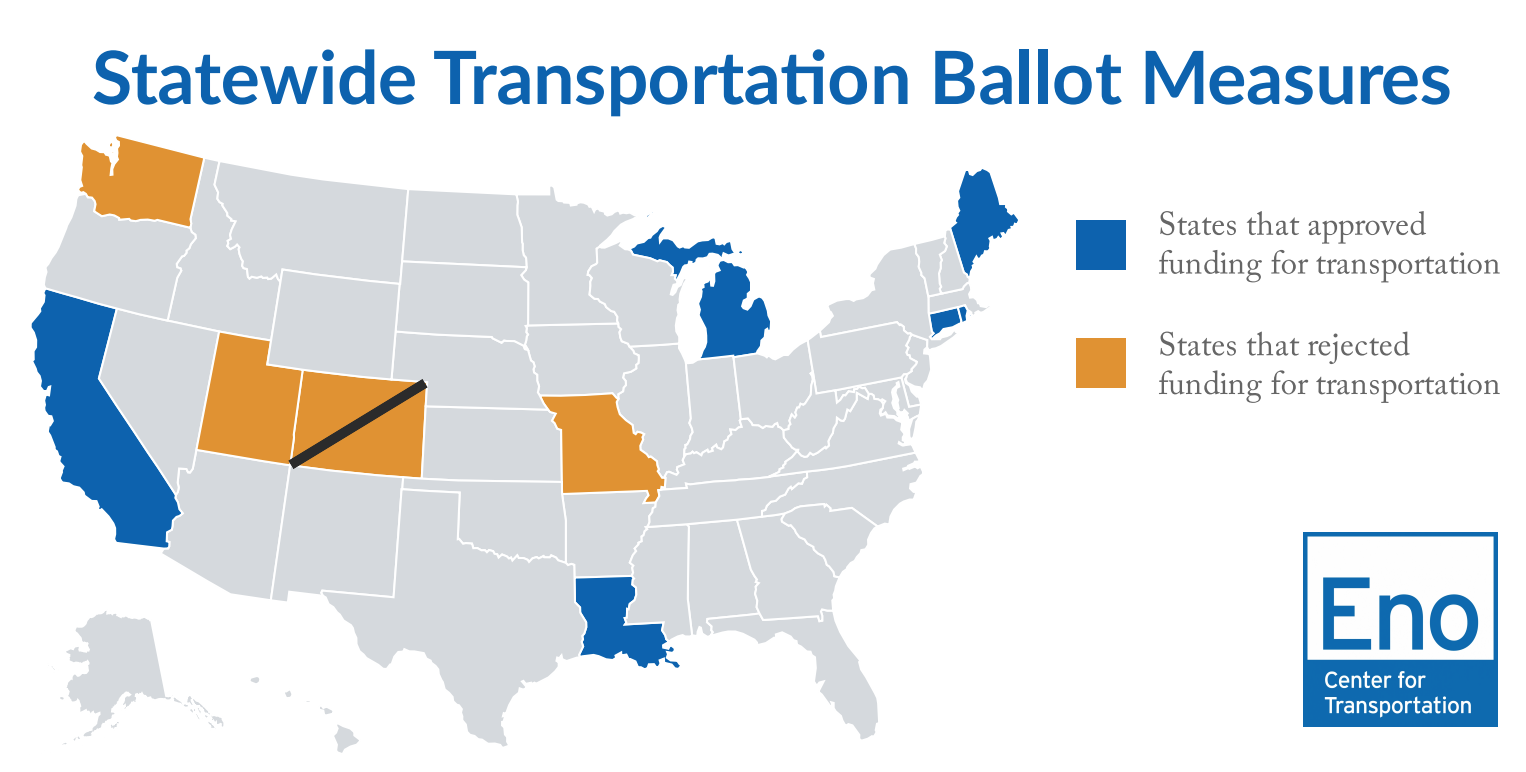November 7, 2018 – 7:30 a.m.
Voters considered over 300 transportation-related ballot measures this Election Day. While Eno will have much more extensive analysis in the coming weeks, key transportation ballot measures generally fared well, with some noteworthy exceptions.
Where transportation won
One of the most closely watched ballot measures was California’s Proposition 6, which would have repealed last year’s gas tax increase. Voters rejected the measure—meaning the gas tax increase will remain in place—55%-45%. (This June, voters approved Proposition 69, which put revenue from the increase in a lockbox for transportation; some believe that move made it harder for opponents of the increase to make the case that it should be repealed.)
In Florida, two counties approved a combined $16 billion for transportation improvements. Hillsborough County (Tampa) voters approved a measure to raise the sales tax by a penny to fund transportation improvements, 57%-43%. Broward County voters similarly passed a penny sales tax increase, 60%-40%. State-wide, Floridians passed Amendment 11, which among other things removes an obsolete provision from the state constitution requiring high-speed rail to be developed in the state.
In Michigan, voters approved a proposal to legalize and tax recreational marijuana, with $700 million of the excise tax revenue going to road and bridge maintenance, 56%-44%.
In Maine, voters approved the sale of $106 million in bonds for transportation infrastructure, 67-33%. The majority of that will go to roads, though $20 million is earmarked for harbors, ports, and maritime infrastructure.
Rhode Island voters approved Question 3, which authorizes bonds for environment and water projects including the State Bikeway Development Program.
Additionally, two states passed lockbox amendments: in one of the first transportation ballot measures to be called on Election Night, Connecticut voters overwhelmingly approved an amendment to put the state’s Special Transportation Fund in a lockbox; the measure garnered a whopping 88% support. In Louisiana, voters approved an amendment to prevent money from the state’s transportation trust fund from being given to the state police for traffic control.

Notes: California is labeled “approved funding for transportation” as voters rejected a repeal of the gas tax increase. Colorado rejected two statewide measures. This map does not include Florida’s statewide measure, which did not affect transportation funding.
Where transportation lost
Voters rejected some statewide measures to raise taxes for transportation. Missouri voters rejected a proposition to raise the gas tax for the first time since the 1990s to fund transportation improvements, 46.4%-53.6%. In Utah, voters rejected a non-binding resolution asking state lawmakers to raise the fuel tax by 10 cents for education and local roads.
Colorado voters rejected both statewide transportation ballot measures. Prop 109, “Fix Our Damn Roads,” would have directed the state to sell bonds to pay for road improvements; Prop 110, “Let’s Go Colorado,” would have raised the sales tax to pay for road and multimodal improvements. Both failed approximately 40%-60%. (It was not a good night for taxes in Colorado, a Taxpayer Bill of Rights state: voters rejected other tax increases as well, including for education.)
And in Washington, voters rejected Initiative 1631, which would have established a tax on carbon. The proceeds would have gone toward environmental programs, including some transportation programs such as zero-emissions vehicle infrastructure and transit.
More analysis to come
It is important to note that this is only a few of the over 300+ transportation measures that were on ballots this Election Day, in addition to nearly 200 already decided by voters earlier this year (most of which, in both cases, were routine Michigan and Ohio millages that tend to pass overwhelmingly). Stay tuned for much more analysis on the full slate of transportation ballot measures in the coming weeks.
In the meantime, watch Eno’s rapid response webinar from Wednesday to hear our initial findings on which key transportation ballot measures passed and failed, and what the makeup of the next Congress could mean for relevant committee leadership positions and the possibility of a federal infrastructure bill.




